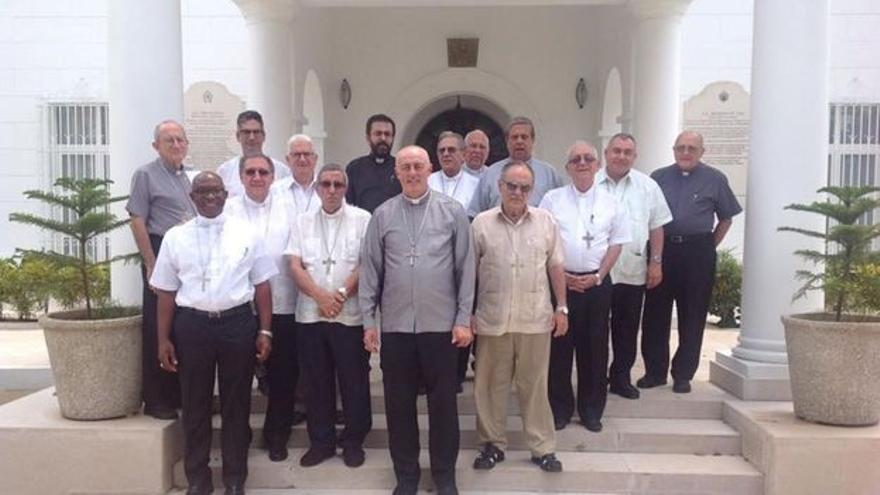
14ymedio, Havana, 12 December 2020 — On Saturday, Cuba’s Catholic bishops published their traditional Christmas message which, this year, includes calls “for dialogue and negotiation between those who have different opinions,” a few words that arrive in the middle of a strong defamation campaign on the part of the government against its critics.
“As pastors we are looking at a tired and overwhelmed people,” warns eleven bishops and Cardinal Juan de la Caridad García Rodríguez, who signed the text. “Material deficiencies, spiritual fatigue, personal, family and national economic insufficiencies that severely affect life in the present and cast a shadow over the future.”
Some problems that “are weighing on the souls of the vast majority of Cubans. The existing economic crisis, the COVID-19 pandemic and the consequences of natural phenomena cause fears and uncertainties within the population,” they itemized.
According to the signatories, gathered at the Conference of Bishops of Cuba, these difficulties especially strike “the most disadvantaged: pensioners, the unemployed, single mothers, the sick, prisoners and the elderly living alone and in need.”
“In the midst of this situation, in addition to the proposals for a solution provided by the authorities of the country, so many others have been expressed, the result of the genuine love and commitment of Cubans,” some proposals that “must be heard and attended to,” the priests claim.
The message includes a list of the good news that Cubans need to hear, such as that “the burden of getting food becomes a serene sharing of daily bread as a family” and also “that the announced readjustment of the national economy, far from raising the concerns of many, will help everyone to sustain their family with decent work, with sufficient pay and with the ever-necessary social justice.”
Avoiding “violence, confrontation, insult and dismissiveness, to create an atmosphere of social friendship and universal fraternity” is also part of those good news that the population hopes for, along with “intolerance giving way to a healthy plurality, dialogue and negotiation among those who have different opinions and criteria.”
What the bishops long for is that “Cubans not to have to look outside the country for what we should find within; that we don’t have to wait for them to give us from above what we ourselves should and can build from below.” In addition to “ceasing all blockades, external and internal, and giving way to creative initiative, the liberation of productive forces and laws that promote initiative.”
Only in this way will “everyone feel and be able to be the protagonist of their life project and, in this way, the Nation will move towards comprehensive human development,” consider the signatories of the message. The text concludes with a Christmas message for “all Cubans, wherever they are.”
The message of the bishops comes in addition to several voices who in recent weeks have criticized, from within the Catholic Church ,the plight that is being lived on the island. Last November, the Cuban Conference of Religious (Conferencia Cubana de Religiosos y Religiosas, CONCUR) condemned that it was not right what “is happening with the supposed currency exchange, which has become an almost permanent and threatening shadow.”
CONCUR, which brings together the consecrated nuns and priests of the Catholic Church, thus joined with several priests of the island and the diaspora who in recent weeks have raised their voices to blame the Government for the lack of freedoms and food suffered by the country.
The first was the priest Jorge Luis Pérez Soto, parish priest of San Francisco de Paula, in the municipality of Diez de Octubre, in Havana, who in October claimed in a homily that the Church should get involved in politics.
A few days later, another priest, Laureano Hernández Sasso, lamented the deafness of Cuban leaders. “Why do we have to beg? Why does President Miguel Díaz-Canel speak and speak and never say anything? Or is it that we have to tell our president that we can’t go on like this?” the priest wrote on his Facebook account.
On November 1st, it was the Camagueyan priest Alberto Reyes, who spoke of the fear toward the regime and the situation that is being lived on the island. “Cuba is a big jail where, if you misbehave, they put you in a smaller one. And as in a prison, at last, we felt controlled,” he denounced in his social networks.
From Miami, he was supported by the rector of Ermita de la Caridad (the National Sanctuary Hermitage of Charity), Fernando Heria, who called on the bishops of Cuba to speak out against the regime, since Cuban priests “are tired of living under two types of dictatorships: ecclesiastical and government.”
Translated by: Hombre de Paz
____________
COLLABORATE WITH OUR WORK: The 14ymedio team is committed to practicing serious journalism that reflects Cuba’s reality in all its depth. Thank you for joining us on this long journey. We invite you to continue supporting us by becoming a member of 14ymedio now. Together we can continue transforming journalism in Cuba.
